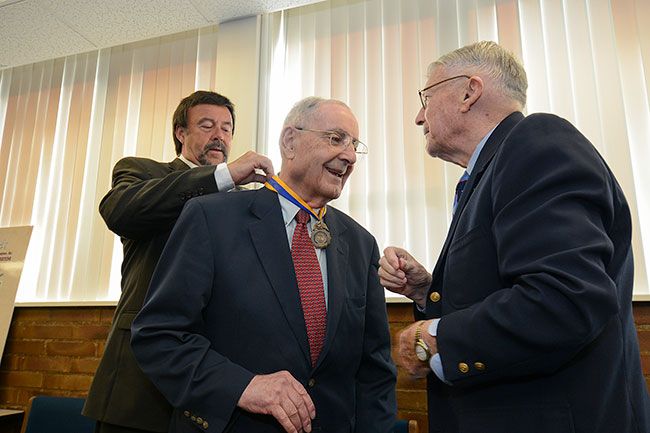James Moore: Vic Atiyeh remembered for unbending principle

He served from 1979 to 1987, a span marked by an overwhelming recession, the forced remaking of the state’s timber industry, a Rajneeshee takeover in Central Oregon and the opening of the state to international trade.
He faced two crises that could have ended his governorship, one triggered by the criminal conviction of a close friend, a former Oregon speaker of the House, and the other by his commutation of a murderer’s prison sentence, which he subsequently revoked.
Atiyeh was guided by a strong set of principles. He began to assemble them as he was growing up, and they were fully formed before he ran his first campaign for the Oregon House in 1958.
When people asked him how he made tough political decisions, or how he survived the messy world of politics, he responded, “All you need is a set of principles and common sense.” Though those principles became clear to him early on, he did allow them to evolve over time, just as one would expect for a man encountering the realities first of legislating and then of governing.
The most interesting parts of his political life arose when deeply held principles collided with each other. How he weighed his decisions and worked to understand issues became a central part of his governorship.
Atiyeh’s guiding principles included:
1.The best government is one that is least involved in people’s lives.
2. The government that is closest to the people is best. Layers of government and bureaucracy required compelling justification for him.
3. Democracy is not efficient, and that’s a good thing.
4. People may want a public life and private life, but in the end, “you’re one person,” he opined. “If you’ve got a private life that is slippery, there’s no way you can prevent yourself from being slippery in public,” he said.
5. “We the people” means we get the kind of government to which we are entitled. It also means people have a responsibility to take part in civic life, and Atiyeh extended that to studying issues and candidates before making voting decisions.
6. There should be objective government policies for dealing with taxes and funding. This made Atiyeh a self-avowed fiscal conservative.
He demanded strong justifications for changes in taxes and funding. But if those justifications were sufficient, he could support increases in both.
That principle became an issue for Atiyeh when he proposed a tax surcharge in 1982 to balance a badly depleted budget, and again when the lottery was created in 1984 and legislators wanted to spend the resulting take on established programs.
7. Government should create positive incentives, as well negative sanctions, to change bad behavior.
8. An officeholder should never support something violating his closely held principles, even in exchange for something of importance in exchange. Atiyeh would research issues so well he often understood them better than their proponents. Then he would vote his conscience, without regard to what it might cost him.
9. Partisanship should have no place in decision making. The guide should be what was best for Oregon.
10. Re-election should be disregarded as well. In practical terms, this meant Atiyeh was often late to declare his intentions to seek re-election or run for a new office, which served to drive his staff a bit crazy.
11. To these original principles he added one more from his experience as Republican leader in the Oregon Senate and later as governor: When in a leadership role, it is the job of the leader to guide his group to success in issues he did not necessarily support and look for solutions in ways he might not otherwise have chosen.
Atiyeh respected the fact that other people could have different principles.
If they used those principles to come to different conclusions than he did, he had no problem with that. “It’s those who don’t have any set of principles, or don’t have any common sense; I don’t have a great deal of respect for them,” he said.












Comments